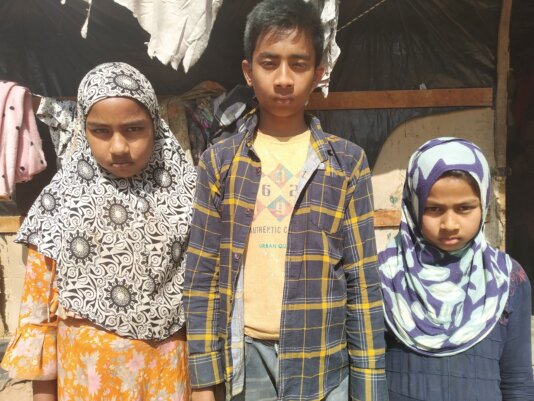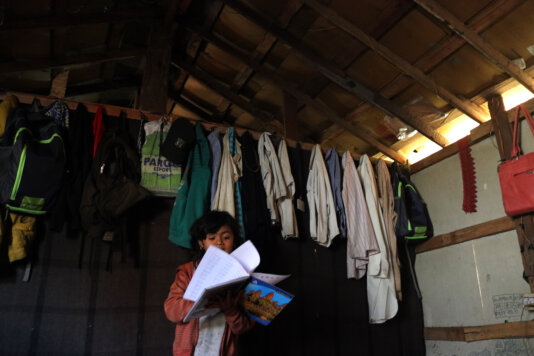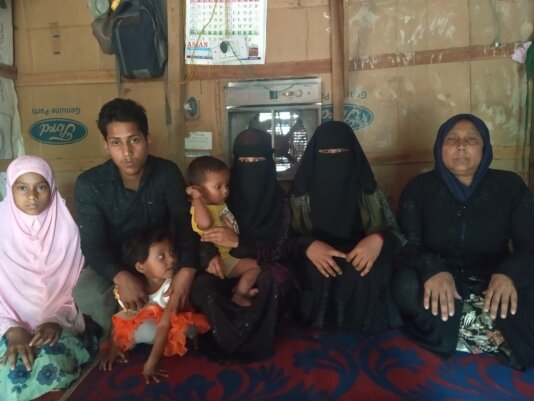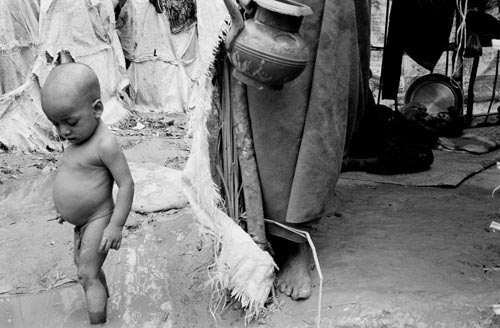- About
- Topics
- Picks
- Audio
- Story
- In-Depth
- Opinion
- News
- Donate
- Signup for our newsletterOur Editors' Best Picks.Send
Read, Debate: Engage.
| April 20, 2022 | |
|---|---|
| topic: | Refugees and Asylum |
| tags: | #India, #Myanmar, #Rohingya, #refugees |
| located: | India, Myanmar |
| by: | Aakash Hassan |
Sitting in a rundown shanty, 9-year-old Noor looks at the photograph of her mother and cries. It has been months since she has seen her mother, Hasina Begum.
The last time Noor had met her mother was around four months ago, when she and her two elder siblings were allowed to talk to her through a glass partition at Hiranagar jail.
Begum was rounded up into a detention centre along with around 240 other refugees in March 2021 in Jammu, a city in Indian-administered Kashmir, as the Indian authorities intensified their crackdown on Rohingya asylum seekers.
Despite holding valid UN Refugee Agency (UNHCR)-issued ID cards, which are supposed to offer protection from arbitrary detention, the authorities said they are living illegally in the country and will be deported back to Myanmar, the country they fled after facing genocidal violence.
Separated from her children and husband, Begum was detained for a whole year in the jail house, which police describe as a "holding" centre for "Rohingya refugees illegally living in the country." In March, the authorities announced that Begum had been deported back to Myanmar.
"She was deported on 15 March," Prem Kumar Modi, the jail superintendent at the Hiranagar detention centre, told FairPlanet. "We are preparing to deport all other 275 Rohingya detained here."
Begum’s family got to know about her deportation through media reports.
Ali Johar, her husband, has been working hard as a daily wage worker to feed his family. "It has already been a difficult year to earn [money] and take care of the children," said Johar. "We are shocked to know that she has been sent back to the country which we left after our people were butchered."
37-year-old Begum came to India with her family in 2012 fleeing violence in Myanmar when she was five months pregnant with Noor.
Noor and her two siblings have been making desperate appeals that their mother be released from detention, saying she was living in terrible conditions. "We went to meet her three times in the jail and she would always cry and complain that the jail conditions are terrible," 15-year-old Hussain Ahmad, her oldest son, told FairPlanet. "She was frustrated there and would hit her head on the wall."
Since learning about Begum's deportation, the family is devastated and the children are unable to eat properly.
Begum’s deportation instilled fear in the entire Rohingya community in India, which numbers around 40,000 people who mostly live in refugee camps in poor conditions. Just a couple of weeks after Begum’s deportation, the authorities detained 25 Rohingya refugees who were part of the Tablighi religious group in the Ramban area of Kashmir and detained them at the Hiranagar jail.
Since Prime Minister Narendra Modi's Hindu nationalist Bharatiya Janata Party (BJP) came to power in 2014, violence towards Rohingya refugees in India intensified, as did the authorities' crackdown on the community. Experts see it as part of a larger trend of increased hostilities against Muslims in the country under the BJP administration.
Even BJP leaders in Jammu, where around 5,000 Rohingya refugees live, have launched campaigns demanding the expulsion of all Rohingya from the region.
The detention of Rohingya refugees has reportedly divided families. In some cases, male members of a family have been detained, while in others female members of the family have been sent to detention centres. "We do not understand what crime we have committed," said 45-year-old Dildar Begum, whose 16-year-old son, Ansarullah, was arrested and sent to jail recently. "We are living here because the situation in our country is not peaceful. We are being killed there," she said. "Once the situation is better in our country we will go back."
Human rights groups have raised concerns over the situation and called on the Indian authorities to protect the rights of Rohingya refugees granted under international law.
Human Rights Watch in a statement said that Rohingya refugees are facing "life-threatening risks" in India due to the authorities' "cruel disregard for human life."
"We are living here because the situation in our country is not peaceful. We are being killed there."
"The Indian government gains nothing by forcibly returning a Rohingya woman to Myanmar, while she is separated from her children and put at grave risk," said Meenakshi Ganguly, South Asia director at Human Rights Watch. "The government’s decision to expel Rohingya refugees despite mountains of evidence that their lives and freedoms would be at risk in Myanmar shows cruel disregard for human life and international law."
"The Indian government should not abandon its long history of providing refuge to the persecuted to allow religious beliefs to dictate who deserves protection," Ganguly said. The intensified crackdown has forced many people to shift to other Indian cities and some are leaving for Bangladesh, where Rohingya refugees are already living in precarious situations.
"Instead of getting arrested, landing up in jail and then getting deported to the hell-hole we escaped, it is better we move to some other part," said Aayatullah, who has been living in a Jammu camp since 2010.
Meanwhile, Rohingya activists are working hard to help the community members. "What we are seeing is that anyone who is travelling, even within the state, is being detained, so we are informing community members to avoid travelling for some time,” Ali Johar, a New Delhi-based Rohingya rights activist, told FairPlanet.
"We are also approaching human rights organisations so that Rohingyas do not have to face such issues," added Johar, who is hopeful that the Indian authorities will halt arbitrary detentions and deportations of Rohingya refugees.
Image by Aakash Hassan.
By copying the embed code below, you agree to adhere to our republishing guidelines.





